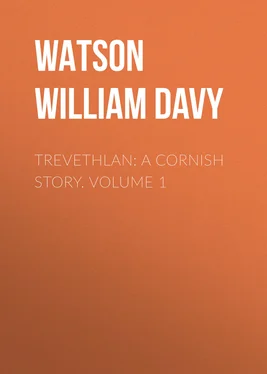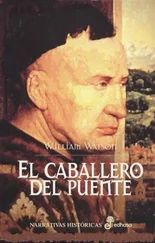William Watson - Trevethlan - A Cornish Story. Volume 1
Здесь есть возможность читать онлайн «William Watson - Trevethlan - A Cornish Story. Volume 1» — ознакомительный отрывок электронной книги совершенно бесплатно, а после прочтения отрывка купить полную версию. В некоторых случаях можно слушать аудио, скачать через торрент в формате fb2 и присутствует краткое содержание. Жанр: foreign_prose, foreign_antique, на английском языке. Описание произведения, (предисловие) а так же отзывы посетителей доступны на портале библиотеки ЛибКат.
- Название:Trevethlan: A Cornish Story. Volume 1
- Автор:
- Жанр:
- Год:неизвестен
- ISBN:нет данных
- Рейтинг книги:5 / 5. Голосов: 1
-
Избранное:Добавить в избранное
- Отзывы:
-
Ваша оценка:
- 100
- 1
- 2
- 3
- 4
- 5
Trevethlan: A Cornish Story. Volume 1: краткое содержание, описание и аннотация
Предлагаем к чтению аннотацию, описание, краткое содержание или предисловие (зависит от того, что написал сам автор книги «Trevethlan: A Cornish Story. Volume 1»). Если вы не нашли необходимую информацию о книге — напишите в комментариях, мы постараемся отыскать её.
Trevethlan: A Cornish Story. Volume 1 — читать онлайн ознакомительный отрывок
Ниже представлен текст книги, разбитый по страницам. Система сохранения места последней прочитанной страницы, позволяет с удобством читать онлайн бесплатно книгу «Trevethlan: A Cornish Story. Volume 1», без необходимости каждый раз заново искать на чём Вы остановились. Поставьте закладку, и сможете в любой момент перейти на страницу, на которой закончили чтение.
Интервал:
Закладка:
"May I read it, Randolph?" his sister asked, timidly laying her hand on his extended arm.
"Read it!" he repeated. "Ay, read it, Helen; read it, and learn what we have become! Well might our father say that a favour received from Philip Pendarrel would disturb him in his grave."
"Was it not kindly meant?" Helen said, gently, after perusing the letter.
"Is insult ever kind?" asked her brother in reply. "Think they the spirit of our house is extinct, that they come in such hot haste to exult over its decay? Helen, the letter gives me heart. Why have we desponded of our scheme? We are not yet absolutely beggars. The last moveable in the castle shall be sold, the last farthing spent, in the struggle for independence. And if it fail, we will come back to our cold hearth, and here, for the last time, our hearts shall beat together as they do now. But, Helen, my dearest sister, we will not fail."
"And this promised visit?" his sister said, after a pause.
"Mrs. Pendarrel must return as she comes," said Randolph. "She does not cross the threshold of Trevethlan Castle while I am its master.—Come, let us take a turn in the gallery."
Helen sighed as she took her brother's arm for the walk he proposed. The conflict which restored his spirit, saddened hers. It seemed a presage of evil, that the first step of the orphans should involve them in a quarrel with their nearest relations. The rowan bends wailing under the breeze which the oak defies. Several times had the length of the gallery been traversed in silence, when Randolph produced a small miniature, and showed it to his sister.
"See, Helen," he said: "they found this upon him. I imagine it is her likeness—Mrs. Pendarrel's."
"It is very beautiful," Helen remarked.
"Very beautiful," repeated her brother, "at first sight. But is it not a beauty rather to fear than to love? There is strong expression in the face—but of what? Is hatred or affection most apparent in those inscrutable dark eyes? Is it good-humour or disdain that curls those lips?"
"And why," Helen asked, "do you think it is a portrait of Mrs. Pendarrel?"
"Because, my dear sister, our poor father told me she was once very dear to him: she encouraged him, he said, and refused him. When they brought me this picture, it recalled his words. There is a key to the history which we have dimly heard."
Again the orphans made several turns in the gallery, musing in silence. Then Randolph spoke:—
"Yes, Helen!—that was the beauty destined to be the ruin of our house. In each successive crash that broke upon his head, our father hoped to find forgetfulness of the past. But it was too deeply written on his heart. And when the desolation was complete, he came back here to hide anguish under pride, to cover tenderness with stern reserve. Hence that cold demeanour which kept even his children at a distance, and, seeming to reject their affection, checked, but did not stifle, its growth. The story has made him more dear to me than ever before. And now she, who broke his heart and drove him to ruin, insults us with her sympathy and her wealth."
"She must herself be old," said Helen. "Perhaps she, too, has had sorrows. I would fain believe you misinterpret that letter."
"Your wish is what it should be," observed Randolph: "I should be glad to think it well founded. Forgive me, dear sister, if, for once, I differ from you. We must not see Mrs. Pendarrel."
The next day Randolph Trevethlan followed his father's remains to the vault in the village churchyard. It was but a short space from the gates of the base-court, and within the precinct still appertaining to the castle. Polydore Riches performed the funeral rites, and the grave closed over the dead.
The chief mourner had been too much absorbed in his own emotions during the ceremony to notice the bystanders; but when it was over, he looked round to thank such as were known to him, for their sympathy and respect. While so engaged, he happened to turn his eye on a couple, who stood a little apart, beneath the shade of an old yew tree. They were a young man about his own age, and a decrepit old woman. They returned his look with an air which might be termed insolent, and which, under other circumstances, might have provoked his anger. But the features of the youth, although coarse and sinister, seemed vaguely to resemble some with which Randolph was familiar, and as he gazed upon them, he asked the chaplain if he knew who the stranger was. Before Polydore could reply, the old woman answered, having seen, not heard, the question.
"Who am I? Thy mother's mother: thy grandmother. Who is this? Thy mother's sister's son: thy cousin. We were not asked to the burying, but we came. To weep for a son-in-law? To weep for an uncle? Did he weep for his wife? Na, na."
Randolph was inexpressibly shocked.
"I dreamt not of this," he said to the chaplain in a low tone. "Something must be done. Are they in distress?"
"Na, na," said the old woman with a frightful grin, again interpreting the motion of his lips, "we want nothing of you, Mr. Randolph Trevethlan. We belong to Pendar'l now. And so will Trevethlan.
'When the castle a bride from the cot shall claim,
Pendar'l and Trevethlan shall own one name.'
Margaret Basset's mother seeks not from a son the help which a husband refused."
Polydore put his arm through Randolph's, and drew him away. The late Mr. Trevethlan's marriage had been a prohibited subject at the castle, and all that his children knew concerning it, was, that their mother had been of humble birth. So this was his son's first introduction to his maternal relations. "It is thus," thought the chaplain, "that the sins of the fathers are visited upon the children."
The resemblance which Randolph had detected in the young man's features, was to himself. It was of that vague character which the eye often discovers in an unknown portrait, depending not on complexion, or lineaments, or even expression, and difficult, therefore, to make visible to another's perception. So now a third person would probably have failed to see the likeness, recognised at once by the heir of Trevethlan. For while candour and courage distinguished Randolph's countenance, cunning and meanness lurked in the aspect of Michael Sinson.
The development of such traits in the peasant might be owing to his early life. When Margaret Basset sorrowfully obeyed the order which seemed to make her mistress of Trevethlan Castle, her family conceived great hopes from her elevation, instead of sympathising in her grief. Her nephew, Michael, was trained in the habits they fancied most likely to conciliate the favour of their lord, vulgar obsequiousness and fawning dissimulation. For some time after Mrs. Trevethlan's death, he was allowed to hang about the castle, enjoying the benefit of Polydore's instruction, and encouraged in the idea, that he might grow to be the confidant and companion of the youthful heir. Those who thought so, little knew Mr. Trevethlan. Pride hates the sycophancy which is acceptable to vanity. He was simply disgusted by the offered homage; and at once perceiving its drift, excluded his wife's relations from all connexion with his household, and ejected them from their little farm. They settled upon the neighbouring estates of Pendarrel, cherishing a natural enmity against their late landlord, and beholding his ruin with a certain exultation. They also chose to consider that poor Margaret had been aggrieved by the compulsion in which they themselves participated, and thus sharpened craft and malice with the feeling of injury. With such spiteful mind old Maud Basset came to the funeral, and flung in Randolph's teeth a prophecy, which had been much recited of late years among the peasantry of the neighbourhood.
And now Trevethlan Castle re-assumed its usual appearance. One of Randolph's first cares after the funeral was to warn Jeffrey, the porter, that all visitors whatsoever who might present themselves at the gates, were to be informed neither he nor his sister was at home, and were not to be admitted on any pretence. Archbishop Secker is reported to have said, that the first person who used this excuse told a lie. It sorely puzzled old Jeffrey's notions of morality.
Читать дальшеИнтервал:
Закладка:
Похожие книги на «Trevethlan: A Cornish Story. Volume 1»
Представляем Вашему вниманию похожие книги на «Trevethlan: A Cornish Story. Volume 1» списком для выбора. Мы отобрали схожую по названию и смыслу литературу в надежде предоставить читателям больше вариантов отыскать новые, интересные, ещё непрочитанные произведения.
Обсуждение, отзывы о книге «Trevethlan: A Cornish Story. Volume 1» и просто собственные мнения читателей. Оставьте ваши комментарии, напишите, что Вы думаете о произведении, его смысле или главных героях. Укажите что конкретно понравилось, а что нет, и почему Вы так считаете.












